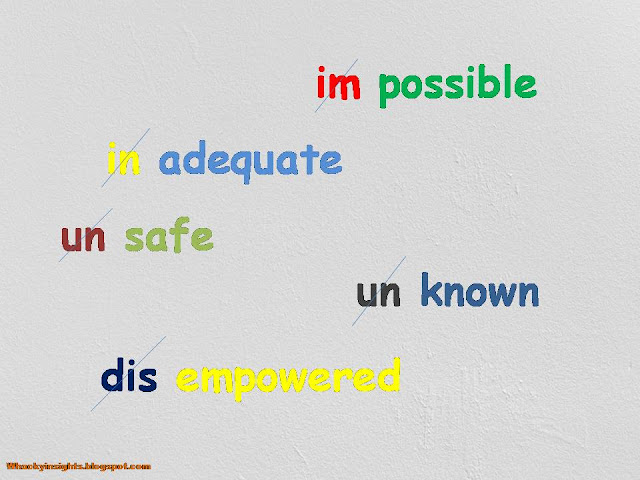We
have at times come across situations and circumstances which made us feel helpless, as if we had no control over the outcome. We become so disheartened in
those circumstances that we do not even try to get out of the problem.
Most
often, our vulnerability in such a situation is due to our limited self-beliefs, in psychological terms it is
called LEARNED HELPLESSNESS. This happens when we have faced a similar
circumstance in our childhood or at an earlier time
when we were not mature enough to handle it, and this scars us to such an
extent that in the future whenever we come across a similar situation, we
presume the outcome to be doomed.
Our limiting beliefs
are learned/acquired i.e. we are not born with them. And hence like any other learned behavior, we can unlearn
those beliefs/behavior patterns.
The
following can be considered to help ourselves break out of limiting beliefs and empower ourselves.
1.
Awareness:
First and foremost you need to find the origin of your
limiting beliefs. Carefully analyze your childhood or an earlier time when
you would have faced a similar situation.
Stressful situations, trauma, pain, the negative
or faulty mindset at an earlier time can
manifest itself as self-deprecating or
dangerous behavior patterns in the future. For example, if a child is not
allowed to make its own decisions, it
will grow up to be a meek and timid, running away from responsibilities &
avoiding taking any decision.
Further,
we can analyze the limiting beliefs as:
a.
Internal
v/s External: When you faultily assign the reason of your
limitations as some internal cause, you hold yourselves responsible; as if you
are at fault, somehow you are the sole cause of all your misery. You must stop
blaming yourselves and try to understand the nature of your limitations.
Consider a case
when a person has failed his exams very badly because he/she could not
concentrate and focus while reading. And due to this,
they make an internal decision they are not good at studies and hence give up
all hopes on education. Perhaps their lack of concentration could have been due
to a noisy roommate or loudspeakers from
neighbors.
b. Permanent v/s Temporary: we
all remember our first time on stage; it may not have been a good experience
for all of us. We might even have been laughed at for mispronouncing/mixing up a
few words or some of us might have gone
totally blank.
The truth is
this is totally normal; it would have been at a time when you were not
experienced enough, you would have been nervous, not well rested. And all of
these are temporary limitations and these do not make you a bad speaker
permanently. The idea here is to learn and refine yourselves from your mistakes
and be confident. And you should not make a boulder out of a small pebble.
c. Global v/s Specific: We
have at times come across an abusive/narcissistic boss, who never appreciates our
work. Under such circumstances, it may
have appeared to us that we are not good enough and good at nothing.
What you need to
do before arriving at this self-defeating
conclusion is to consult with some other ‘neutral’ well-informed person and get their opinion. More often you will be
surprised by the fresh perspective. Thus,
failure in specific situations or perhaps in someone’s specific perspective may
not be extended to everyone/everywhere else.
2.
Alternative
Explanations :
The awareness of your limitations changes your
perspective; you will have a broader outlook and will look at your life events
in a totally different light. You will perhaps develop alternative explanations
for all those failures, which were, in reality, temporary setbacks and more
likely something external of you; only a
specific situational limitation and not defining your whole life.
This alternative approach has the power to take the
load off you immediately and place it right
where it belongs, paving a way for an optimistic outlook on life.
3.
Replacing
Negative Beliefs:
Adversities are a part of life, what defines us is
how we face and overcome them, do we let them cripple us or use them as a
stepping stone and rise higher. Our ‘beliefs in life’ are the subconscious
programs which define how we react to them. A negative, self-defeating belief obviously will not do any good.
Your job here is to consciously identify each and every
negative limiting belief; which is coming in between your true empowered selves
and an imaginative crippled state. Each of them needs to be replaced with
positive explanations and beliefs which eventually lay a strong positive
foundation.
4.
Setting
Smart Goals:
Once you successfully take out the weeds, you will
realize that there is a gap between where you are and where you want to be and this
needs to be handled carefully, making sure you do not fall back into the
previous limiting cycles off misplaced beliefs. You may need to acquire some
new skills or brush up some previously learned
to bolster and set yourselves onto a series of steps towards achieving success.
You need to recognize and be SPECIFIC in your goals
with each goal broken down into MEASURABLE smaller bits which are ACHIEVABLE in
a REALISTIC sense and are TIME bound.
While
you are chasing your goals do not forget to take time off and celebrate your
smaller successes in between, this will reinforce optimism and empower you from
within.



Comments
Post a Comment